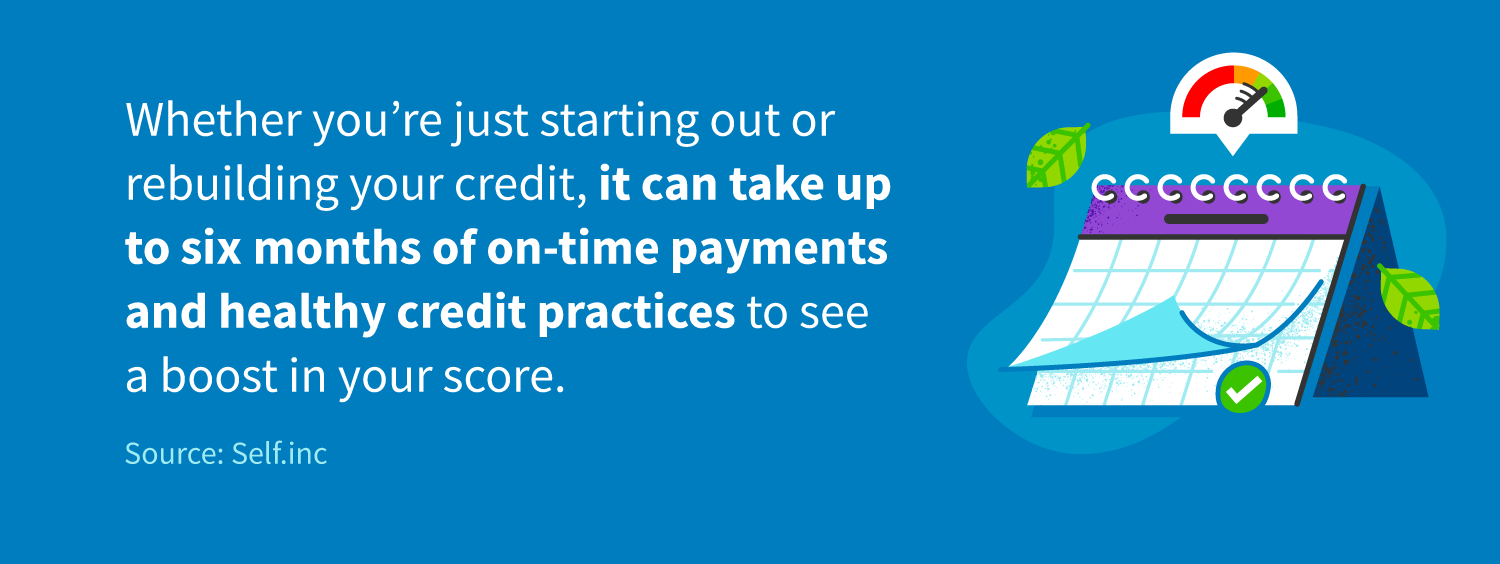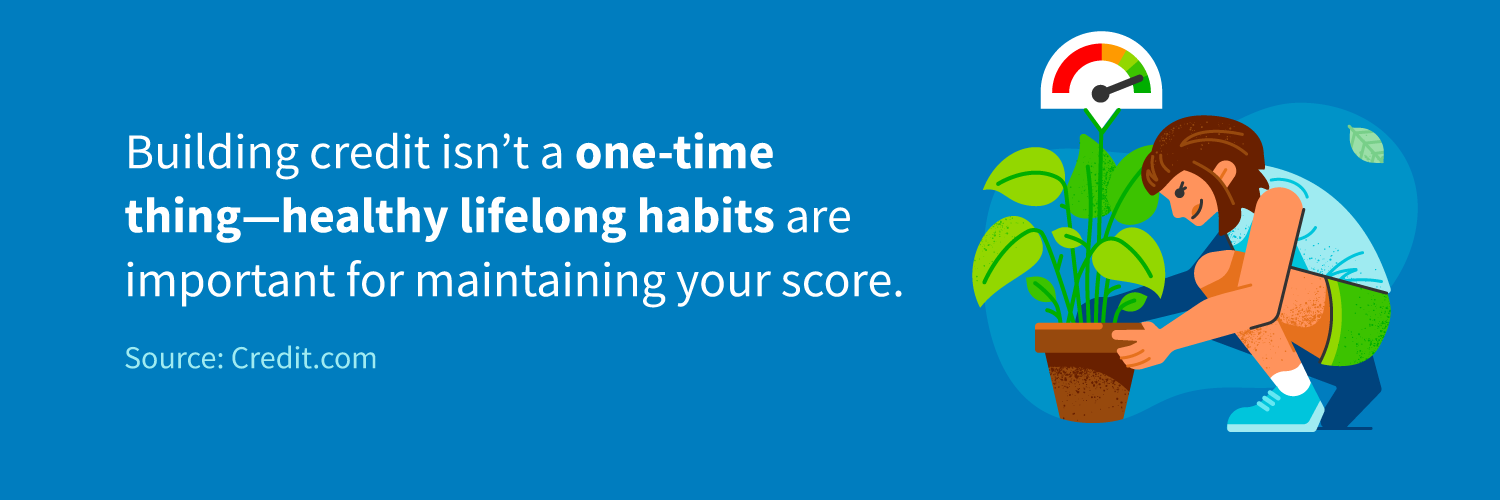
Disclosure regarding our editorial content standards.
While building credit is different for everyone, it typically takes about six months of healthy practices to establish a good baseline of credit. Building up to an even higher score just takes time. You may start seeing positive changes as early as a few months, but most importantly, remember that building and maintaining credit is a lifelong practice.
Your credit score doesn’t exactly start from zero when you get your first credit card—there are lots of factors that go into determining your credit health. Whether you’re just getting started on your credit journey or you’ve been in the game for a while, building your credit takes a bit of strategy.
It’s not a one-and-done deal, so we’ve put together what you need to know and some tips to keep your credit on track.

How is your credit score calculated?
Your credit score is calculated with a few notable metrics under the FICO® model:
- Payment history. Do you have a history of consistent, on-time payments or a record of late payments and delinquencies?
- Credit utilization. How much of your credit are you using?
- Length of credit history. How long have you had credit to your name?
- Credit mix. Can you responsibly manage a variety of credit, from loans to credit cards?
- New credit. Do you have new hard inquiries on your report that have caused your score to dip?
These are the core factors that impact your credit health, but again, every situation is different. Your credit health will come together based on your unique financial situation. These factors impact the scores of all credit users, whether you’re the new kid on the block or you’ve been around for a while.
Building credit from scratch
If you’re starting from square one, it can take closer to six months to see any significant changes in your credit health. That’s because you likely don’t have a significant enough credit history for lenders to go off of. You likely won’t be able to get a card with lots of benefits or stellar terms, but using it responsibly—i.e., paying the full amount on time, keeping your utilization low and so on—will help you move up and move on to more sophisticated cards in no time.
Rebuilding credit
The time it takes to rebuild your credit is variable—it depends on where you’re starting and how much work you have ahead of you. For example, if you had a few rounds of late payments and are working to pay off that extra interest, six months or so of strict on-time and full payments will help you see progress.
On the other hand, if you’re working with a past bankruptcy or foreclosure, these can stay on your credit report for seven to 10 years, so even regular payments and healthy credit usage won’t fix your credit in a few months. It will likely take much longer for you to see a significant boost in your score.
7 tricks to build credit faster (and smarter)
You’re probably excited to get started and ready to get to that coveted score in the high 700s or even 800s, whether you’re starting from scratch or looking to turn your credit around. There are some tricks that can help you bump up your score quickly without compromising your credit health—no quick fixes required.
Here are some of the best moves you can make to build up your score and establish healthy long-term credit habits.
1. Become an authorized user
Becoming an authorized user is a smart move if you’re just starting to build credit, making it a wise choice for parents of teenagers or college students. Authorized users have permission to use the cardholder’s account but aren’t responsible for the bill.
If you have a trustworthy family member who’s responsible with their finances, becoming an authorized user on their account can offer you the same benefits (including a starting point for building your credit score) without the burden of credit in your name. Plus, this is a great opportunity to teach teens and students about credit.
2. Sign up for a secured credit card
A secured credit card requires a cash deposit as collateral. This is ideal for young and new credit users: Since you likely have little to no credit history for lenders to base their approval off of, putting up money will give them something to fall back on if you fail to make payments. Using a secured credit card responsibly for some time will help you establish a strong baseline of credit health and open the door to cards with higher limits and more benefits.
3. Pay down your debts
A no-brainer, paying down your credit card debt is a good way to build up your credit. Putting more money into your bill payments decreases your credit utilization, positively contributes to your payment history and shows lenders that you can responsibly manage loan payments. You can use tricks like the snowball method to shrink your loan payments.
4. Keep your credit utilization ratio low
Like we mentioned above, your credit utilization is an important part of how your credit score is calculated. Keeping it low shows the bureaus that you are able to spend within your means and pay your bills on time. All of this contributes to a healthy score for the long term.
5. Regularly check your credit report
Your credit report is one of the best tools you have at your disposal to keep a finger on the pulse of your credit health. You can request a free credit report every year from each of the three bureaus, and there are various credit monitoring services to keep track of any fluctuations.
6. Ask for a credit limit increase
No harm in asking, right? If you’ve been handling your credit like a pro for some time and only using 30 percent of your limit, it’s worth asking for a credit limit increase. Lenders and banks will often give these automatically when they see users behaving responsibly, but sometimes you just have to ask.
Increasing your limit can help lower your utilization ratio if you keep your spending the same, which, in turn, will help increase your score in due time. Give your bank or lender a call to request an increase.
7. Look into credit builder loans
A credit builder loan helps people build up their credit. The borrower applies for a loan but doesn’t get access to the money up front. Instead, they make monthly payments on the account until they’ve paid off the entirety of the loan. When the payments are done, the loan funds are released to them.
The credit builder loan helps you build positive credit by reporting the monthly payments to the credit bureaus. Additionally, it helps teach you how to save, as you get to build up your loan amount with every payment.
You don’t need a strong credit score to receive a credit builder loan, but you’ll need to show you have the income to make the monthly payments. Additionally, credit builder loans aren’t that common. You may have to go to a credit union or community bank as many traditional banks don’t offer this product.
How to keep good credit
There are a few things that can help you keep up your good credit standing:
- Credit cards: If you can trust yourself to be financially smart with credit cards, you can leverage them to benefit your credit score. The key is to always make your credit payments on time and in full and to keep your credit utilization in mind. Additionally, while you can occasionally apply for new credit cards, do so carefully. Don’t apply back-to-back with other credit cards or loans, as this can lead to several hard inquiries on your report in a short period, which can drag your score down.
- Pay your bills on time: Always pay all your bills on time. One way to make sure you pay your bills is to set up auto payments wherever you can.
- Keep your credit accounts open: One of the five factors that make up your credit score is credit history length. You should always keep your oldest credit accounts open so your credit history length doesn’t suddenly get cut shorter.
- Seek credit variety: Credit mix makes up 10 percent of your credit score. Having a combination of revolving accounts and installment loans shows lenders you can be responsible with all kinds of credits and boosts your overall credit score.
Try to avoid these things
Watch out for these mistakes that can quickly lower your credit score:
- Falling behind on your payments: Even one late payment can end up on your credit report, lower your credit score and stay on your account for up to seven years. If you find yourself unable to make payments, contact your lender immediately and see if you can negotiate a lower monthly payment or a repayment plan.
- Applying haphazardly: Keep in mind hard inquiries when applying for credit. One hard inquiry may temporarily dip your score, but you should see a quick recovery. However, multiple hard inquiries in a short time can lower your score significantly and for a longer time.
- Overcharging: Going over your credit limits is a fast route to not making your payments and getting into debt. Never spend what you can’t afford to pay back immediately.
- Closing your accounts: Closing accounts can sometimes be okay if you find yourself tempted to overspend or if the card charges you a fee and you don’t get value out of it. However, if you can, avoid closing your oldest accounts as it can shorten your credit history length and lower your credit score.

While all of these tips can help you improve your credit if you’re new to the game or you need help getting back on track, remember: There’s no such thing as a quick solution to building credit. You may see results in a matter of months, but these practices for healthy credit usage are lifelong habits that will keep your credit strong in the long run.
If you ever feel stuck and don’t know what steps to take to improve your credit, our team can assess your credit health and help you get back on track. Request an evaluation today.
Note: The information provided on CreditRepair.com does not, and is not intended to, act as legal, financial or credit advice; instead, it is for general informational purposes only.
Questions about credit repair?
Chat with an expert: 1-800-255-0263






